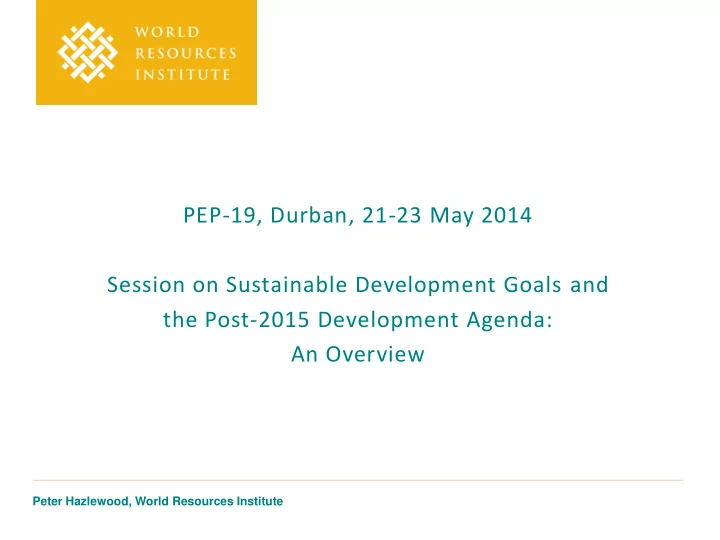

PEP-19, Durban, 21-23 May 2014 Session on Sustainable Development Goals and the Post-2015 Development Agenda: An Overview Peter Hazlewood, World Resources Institute
Session agenda
Presentation Outline I. Overview of process I. Status of SDGs (including green economy, climate change and sustainable cities) I. Roadmap to post-2015 agreement I. A role for PEP?
Part I – Overview of Process MDGs (2000 – 2015): 7 goals + MDG8 on Global Partnership • A North-South development cooperation agenda • Some significant outcomes, but progress very uneven across • goals and geographies MDG7 on Envtal. Sustainability – little impact •
Framework for the Post-2015 Agenda Global Goals, Targets and Indicators Global Policy and Global Monitoring, Implementation Assessment and Frameworks Reporting Poverty Eradication Means of Measuring and Implementation Progress Sustainable Development National Policy and National Monitoring, Implementation Assessment and Frameworks Reporting National Goals, Targets and Indicators
Framework for the Post-2015 Agenda Four key elements: A transformative vision: building on the MDGs and other internationally- • agreed frameworks, the post-2015 agenda must aim to accelerate the shift to sustainable and equitable growth and development pathways Goals, targets and indicators: global and nationally-adapted goals, • targets and indicators to provide strategic direction for action at multiple scales Means of implementation: policy and implementation frameworks to • remove barriers and address drivers of sustainable and equitable growth and development at multiple scales Measuring progress: global and country-level monitoring and reporting • frameworks to guide decision-making and ensure accountability
The Post-2015 Agenda – From MDGs to SDGs Some core features: • Universal agenda • ‘Getting to zero’ on multiple dimensions of extreme poverty; tackling inequality • More balanced treatment of social, economic and environmental dimensions of SD; address critical sustainability challenges • Integrated agenda: linkages within and across goal areas
A Two-track Process (1) UN-led post-2015 development agenda process: • Launched by UN Secretary-General • UN Task Team • Special Adviser on the Post-2015 Development Agenda • National and global thematic consultations; regional consultations • High-Level Panel of Eminent Persons on the Post-2015 Development Agenda (Report, May 2013) www.post2015hlp.org
A Two-track Process (2) Member State-led SDGs Process: • Rio+20 mandate • Open Working Group on SDGs • Intergovernmental Committee of Experts on Sustainable Development Financing http://sustainabledevelopment.un.org/
Part II – Status of the SDGs
Green economy, climate change and sustainable cities in SDGs • (1) Overall vision/narrative; (2) goals, targets and indicators • Green economy: growth/infrastructure, jobs, sectors (food, water, energy, cities/transport… ), sustainable consumption and production • Climate change: goal(?); mainstream through climate-related targets • Cities: likely a goal on ‘sustainable cities’
III. Roadmap to 2015 OWG and Expert Committee submit reports/recommendations to the • UNGA for review in Sept. 2014 UN Secretary- General’s ‘Synthesis Report’ in late 2014 • Intergovernmental negotiation process • UN Head of State Summit in September 2015 • Monterey II Conference on Finance (?) •
Five Key Issues Going Forward Goal architecture: How to construct a more integrated and • comprehensive set of universal goals, targets and indicators – with sustainability and equity at the core – while keeping to a simple and easily communicable framework? National/local ownership: How to link global goals with national and • local-level priorities and the need for policy space to define and implement national and local-level solutions? Finance: Reaching global agreement on an ambitious post-2015 agenda • must include clear commitments on financing for sustainable development (including public/private and domestic/external sources); how to build a more coherent architecture for global development, climate and environmental finance?
Five Key Issues Going Forward Metrics and measurement: A post-2015 sustainable development • agenda will require new metrics ( e.g. ‘beyond GDP’) and mechanisms for integrated (human development and environment) monitoring, assessment and reporting… Accountability: How to ensure that effective accountability mechanisms • for progress and performance monitoring are built into the post-2015 framework?
IV. What Role for PEP? PEP SDG Reference Group Some options: • Making the case (evidence) for integrating poverty, growth and environmental sustainability agendas • How to tackle interlinkages • Implementation – from global to local
Recommend
More recommend